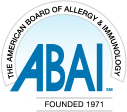In compliance with the ACGME Program Requirements for Residency Training in Allergy and Immunology, a semi-annual record must be maintained and submitted to the ABAI for tracking purposes. The Clinical Competence form evaluates the resident's knowledge, skills, overall performance, and development of professional attitudes consistent with being a physician, by rating them on the 6 General Competencies and in Allergy/Immunology-specific competencies.
This form is displayed for reference only. Please submit all training documents via the new ABAI Web Portal. Program Directors have an account set up for them and must verify their account to set a password. Contact the ABAI office with questions.
